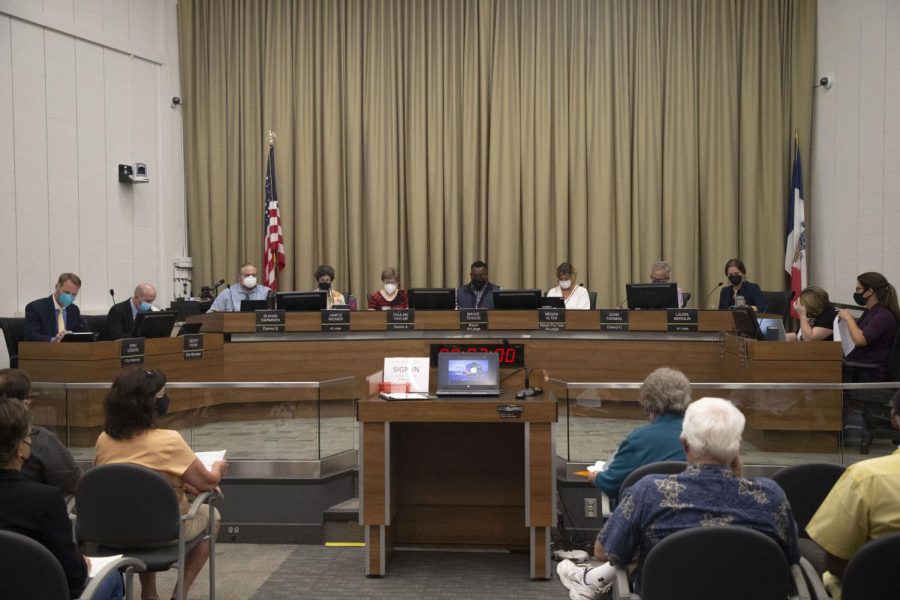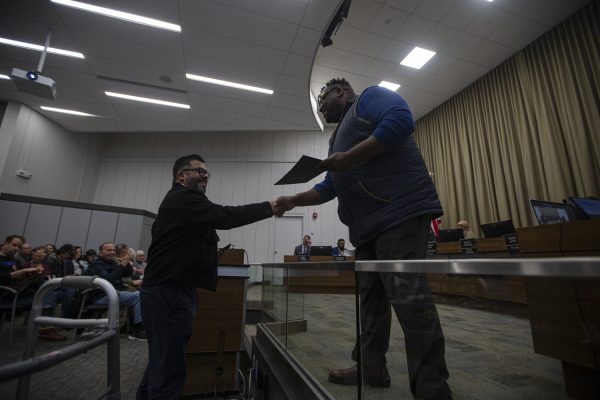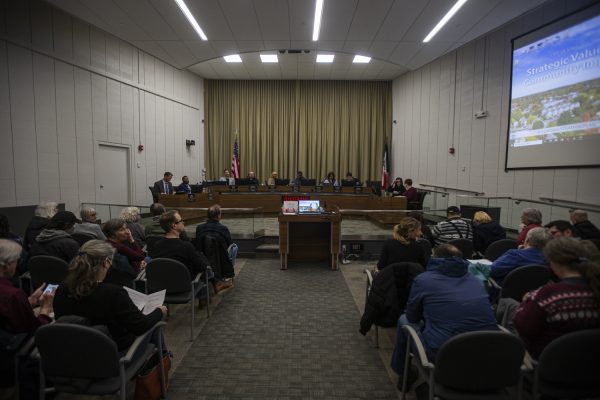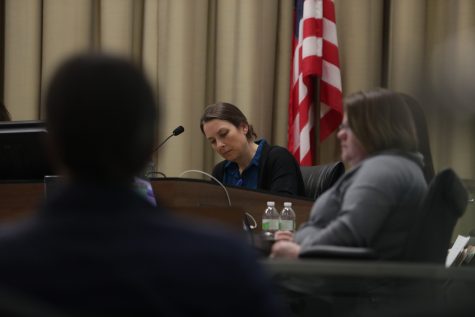Iowa City City Council postpones vote to remove Truth and Reconciliation Commission chair
The council tabled a vote to remove Amel Ali from the Truth and Reconciliation Commission for the second time on Tuesday.
The Iowa City City Council on Tuesday, Aug. 16, 2022.
August 17, 2022
The Iowa City City Council indefinitely delayed its decision to remove Amel Ali, the chair of Iowa City’s Truth and Reconciliation Commission on Tuesday night.
The council voted 6-1 to postpone Ali’s removal at the meeting for the second time. Mayor Bruce Teague was the only councilor not in favor of pushing the vote.
City Attorney Eric Goers suggested potentially setting a deadline to revisit this topic during the first meeting after Dec. 6, the last currently scheduled meeting.
The commission was formed in September 2020 to investigate claims of racism in Iowa City and help marginalized groups obtain justice and reconciliation.
The TRC suspended Ali from her leadership position on Aug. 4 after accusations arose that Ali had insulted local Black leaders by using a racial slur on the subscription-based podcast, “Rock Hard Caucus.”
Royceann Porter, the chair of the Johnson County Board of Supervisors, said during the Aug. 2 council meeting’s public comment session that an anonymous source mailed her a USB drive with recordings of two podcast episodes in which Ali allegedly called Porter and other members of the community a racial slur.
The podcast episodes that aired on June 9 and June 16 are no longer available to the public.
Porter, a former chair of the TRC, resigned from the commission in 2021.
Justin Comer, one of the hosts of the podcast, alleged that Porter had lied to the council when she said that the note was delivered anonymously to her. The allegations stem from a public records request of Porter’s text messages which Comer claims reveal that Coralville Mayor Meghann Foster had sent the podcast clips to Porter.
Comer revealed the alleged text messages between Porter and Sheriff Calvin Hayden during the public comment section of Tuesday’s decision. He was among more than 20 individuals who spoke in person and online during Tuesday’s meeting.
Correspondence released by the council prior to Tuesday’s meeting revealed 37 emails to the council since their previously scheduled formal meeting, with more than 30 in support of Ali between community members from inside of Iowa City and beyond.
Council deliberates before delaying decision
Following almost 40 minutes of council discussion after the public comment period, councilors delivered impassioned, minutes-long rationales.
“I know that this is hard, and so just know that my vote is really where Amel is positioned at this time,” Teague said. “I just don’t believe that it’s appropriate for her to be on the TRC.”
Teague and Mayor Pro Tem Megan Alter said they would vote in favor of the removal of Ali to ensure the proper function of the commission.
“I really believe the TRC is a place where people feel welcomed, where people feel they can come and share their truths,” Teague said. “I think that has been damaged by [Ali’s] acts of feeling so comfortable to talk about a group of people.”
Alter said her focus is on respect between all parties involved as well as accountability.
“We cannot disregard what Amel Ali said,” Alter said. “Not when the purpose of the Truth and Reconciliation Commission … is to speak to truth, to come to truth, to manifest respect of others, and to foster reconciliation. In order to do any of that work, there must be trust in the leadership.”
Alter ultimately voted to table action on the removal of Ali after some council debate and said she could accept seeing accountability through some sort of progress without the need for punishment.
Councilors Janice Weiner and Laura Bergus said they would vote against the removal of Ali from her position on the commission.
Bergus said she heard concerns after the council’s special formal meeting on Aug. 4 that more damage could be done if the council takes a punitive approach.
“I’ve heard the concern that, if we take our battering ram to this personal issue, and remove this person from public service, there are folks that will feel unsafe, that will feel unheard, they will feel unrepresented,” Bergus said. “It will cause a cascade of harm.”
Weiner cited a Supreme Court case, Cohen v. California, a case that draws on the majority opinion in Baumgartner v. United States. The opinion, written by former Justice Felix Frankfurter, was read aloud by Weiner in the council chambers.
“One of the prerogatives of American citizenship is the right to criticize public men and measures,” Frankfurter wrote. “And that means not only informed and responsible criticism but the freedom to speak foolishly and without moderation.”
Weiner called it “the law of the land” and concluded her statement with it before indicating her vote against removing Ali. Weiner said she is hopeful for restorative justice for Ali as a result of her comments rather than punitive justice.
“A restorative justice process has begun,” Weiner said. “It’s at the very beginning. It takes time. It takes time to do it. It takes time to heal. I don’t personally believe that a punitive approach is constructive. We’ve seen over and over again in our community, our state, and our country that it’s destructive rather than constructive.”
















